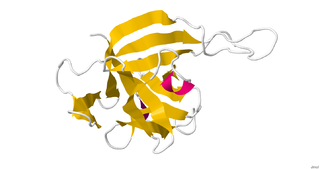
Interleukin 33 (IL-33) is a protein that in humans is encoded by the IL33 gene.

Interleukin 24 (IL-24) is a protein in the interleukin family, a type of cytokine signaling molecule in the immune system. In humans, this protein is encoded by the IL24 gene.

A disintegrin and metalloprotease 17 (ADAM17), also called TACE, is a 70-kDa enzyme that belongs to the ADAM protein family of disintegrins and metalloproteases.

SOCS refers to a family of genes involved in inhibiting the JAK-STAT signaling pathway.
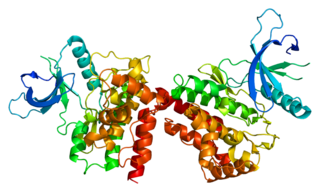
Janus kinase 2 is a non-receptor tyrosine kinase. It is a member of the Janus kinase family and has been implicated in signaling by members of the type II cytokine receptor family, the GM-CSF receptor family, the gp130 receptor family, and the single chain receptors.

Signal transducer and activator of transcription 6 (STAT6) is a transcription factor that belongs to the Signal Transducer and Activator of Transcription (STAT) family of proteins. The proteins of STAT family transmit signals from a receptor complex to the nucleus and activate gene expression. Similarly as other STAT family proteins, STAT6 is also activated by growth factors and cytokines. STAT6 is mainly activated by cytokines interleukin-4 and interleukin-13.

Phospholipase C, gamma 1, also known as PLCG1,is a protein that in humans involved in cell growth, migration, apoptosis, and proliferation. It is encoded by the PLCG1 gene and is part of the PLC superfamily.
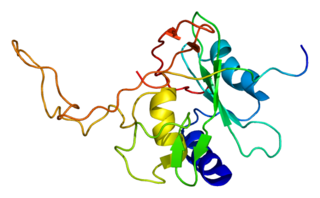
Suppressor of cytokine signaling 3 is a protein that in humans is encoded by the SOCS3 gene. This gene encodes a member of the STAT-induced STAT inhibitor (SSI), also known as suppressor of cytokine signaling (SOCS), family. SSI family members are cytokine-inducible negative regulators of cytokine signaling.
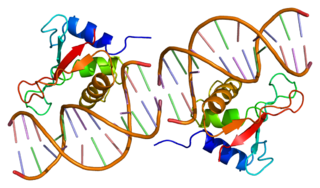
Interferon regulatory factor 1 is a protein that in humans is encoded by the IRF1 gene.

Suppressor of cytokine signaling 1 is a protein that in humans is encoded by the SOCS1 gene. SOCS1 orthologs have been identified in several mammals for which complete genome data are available.

Suppressor of cytokine signaling 2 is a protein that in humans is encoded by the SOCS2 gene.

Inhibitor of growth protein 2 is a protein that in humans is encoded by the ING2 gene.

Interleukin 21 receptor is a type I cytokine receptor. IL21R is its human gene.

Suppressor of cytokine signaling 7 is a protein that in humans is encoded by the SOCS7 gene.

Suppressor of cytokine signaling 5 is a protein that in humans is encoded by the SOCS5 gene.

Tumor necrosis factor receptor superfamily member 18 (TNFRSF18), also known as glucocorticoid-induced TNFR-related protein (GITR) or CD357. GITR is encoded and tnfrsf18 gene at chromosome 4 in mice. GITR is type I transmembrane protein and is described in 4 different isoforms. GITR human orthologue, also called activation-inducible TNFR family receptor (AITR), is encoded by the TNFRSF18 gene at chromosome 1.
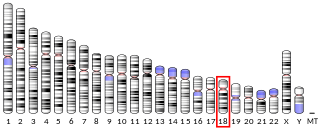
Suppressor of cytokine signaling 6 is a protein that in humans is encoded by the SOCS6 gene.

Ubiquitin carboxyl-terminal hydrolase 20 is an enzyme that in humans is encoded by the USP20 gene.
A non-receptor tyrosine kinase (nRTK) is a cytosolic enzyme that is responsible for catalysing the transfer of a phosphate group from a nucleoside triphosphate donor, such as ATP, to tyrosine residues in proteins. Non-receptor tyrosine kinases are a subgroup of protein family tyrosine kinases, enzymes that can transfer the phosphate group from ATP to a tyrosine residue of a protein (phosphorylation). These enzymes regulate many cellular functions by switching on or switching off other enzymes in a cell.
Adoptive cell transfer (ACT) is the transfer of cells into a patient. The cells may have originated from the patient or from another individual. The cells are most commonly derived from the immune system with the goal of improving immune functionality and characteristics. In autologous cancer immunotherapy, T cells are extracted from the patient, genetically modified and cultured in vitro and returned to the same patient. Comparatively, allogeneic therapies involve cells isolated and expanded from a donor separate from the patient receiving the cells.



















